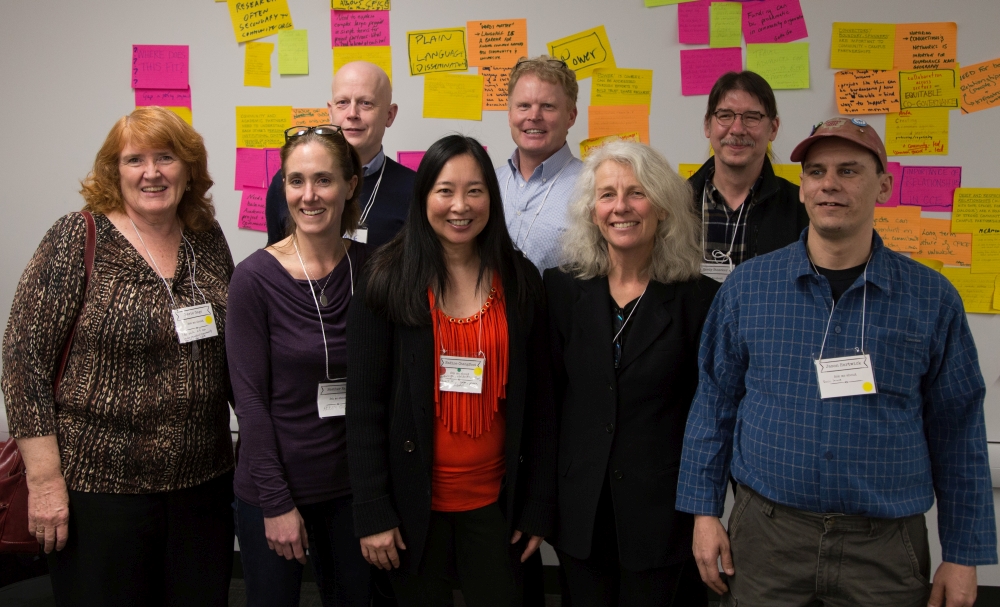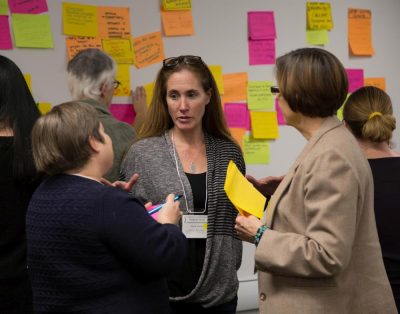by Omar Elsharkawy, CFICE Admin RA
In January 2017, the Community First: Impacts of Community Engagement (CFICE) project hosted a symposium to reflect on and evaluate Phase I of their 7-year research project. The first phase officially started in 2012 when the project received a $2.5 million Social Sciences and Humanities partnership grant. With this money, they partnered with various community-based organizations in five different sectors (Violence Against Women, Community Food Security, Environmental Sustainability, Poverty Reduction, and Knowledge Mobilization) to study how to improve community-campus engagement (CCE) partnerships.

CFICE Community Environmental Sustainability (PBTO-HALIB) Hub team.
L to R, Back Row: David Tough, Stephen Hill, Randy Stoecker.
Front Row: Marie Gage, Heather Reid, Nadine Changfoot, Helen Knibb, Jason Hartwick.
At the end of Phase I, CFICE completed a full-scale project evaluation to review what they had learned about CCE. As Amanda Wilson, Community Co-lead of CFICE’s CCE Brokering Working Group, defines it, “CCE speaks to the various forms of partnerships, relationships and collaborations that are established between higher education institutions (including students, faculty members and staff) and community-based organizations.”
The findings from CFICE’s project evaluation were presented at the symposium, which was attended by both community and academic partners from Phase I. The purpose of the symposium was to reflect on the learnings and outcomes of CFICE’s research. Attendees offered suggestions for improving future CCE partnerships, and celebrated the impacts CFICE achieved through its Phase I partnerships.
The Benefits:
The symposium featured the voices of many of CFICE’s Phase I partners, who travelled from across Canada to attend the event in Ottawa. Among attendees were Marie Gage, Heather Reid, and Jason Hartwick, all community partners from the Community Environmental Sustainability Hub in Peterborough-Haliburton [CES (PBTO-HALIB)]. During the symposium, they presented on the benefits, challenges, and impacts of engaging in CCE partnerships with CFICE.

Jason Hartwick, community participant with the Community Environmental Sustainability (PBTO-HALIB) Hub.
Jason Hartwick, a member of the Active Neighborhoods Canada project, said that he, along with a CFICE student, did public consultations with the community on the design of a street in Peterborough. According to Hartwick, “the RA, has actually become embedded and enfolded within the neighborhood.” Harwick says he has also benefitted since CFICE provided him with the opportunity to attend community-building conferences to share the results of this work.
Marie Gage, a member of the U-Links Centre for Community-Based Research’s management committee in Haliburton, said that from her perspective, CFICE has allowed for graduate students at Trent University to work for the benefit of communities in Haliburton. U-Links is a community-based research centre that connects students with projects in the Haliburton area. In the past, they have primarily worked with undergraduate students. While having the help of undergraduate students has been an asset, Gage notes that undergraduate students are not able to make long-term time commitments to projects, and often they have limited skills compared to graduate students. CFICE was a catalyst for the move to integrate graduate students into U-Links projects because it provided the opportunity for the organization to test out having graduate students work with them.
The Challenges:
As everyone who engages in CCE work knows, CCE processes and partnerships can be challenging and complex at times.
Nadine Changfoot, CES (PBTO-HALIB) Hub Academic Co-Lead, pointed out that there have been some bumps when it comes to timely fund transfers from academic institutions to community partners.
University Business Offices, which ultimately approve or reject money transfer requests, tend to have very rigid requirements for transfers going to community partners. This rigidity is often due to the policies of funders and governments and can result in a disproportionate amount of time spent on translating requirements or going back and forth for information. Additionally, the time for reimbursement can take several weeks to months for items like participation fees or project-related travel costs, creating a burden for community partners.
Since CFICE’s ultimate goal is to improve CCE partnerships, particularly for community, a list of recommendations to overcome these types of challenges was collaboratively developed at the symposium. CFICE’s Phase II work is all about sharing these recommendations with others.
The goal of CFICE Phase II is to provide tools and resources that will help institutions, governments, funders, community organizations, and individuals like faculty and students, change the ways they engage in CCE partnerships to be more community first. As an example, CFICE’s Aligning Institutions for Community Impacts working group is building a Community First Classification tool that will help post-secondary institutions assess how community first they are in their CCE efforts.
The Lasting Impacts:
Despite room for improvement, CFICE has had some significant impacts within the Peterborough and Haliburton communities through its CCE work.
Heather Reid, Operations Director at Abbey Gardens, said that her organization’s overall relationship with Trent University has been strengthened as a result of their work with CFICE. “Because of the length of CFICE, it has made student projects a priority over time, which is great, and it also maintained and created relationships with faculty over time. So it’s given us that capacity [to continue engaging in CCE partnerships]”.
Gage added that, since working with CFICE, three projects within U-Links are in the process of looking for grant applications to hire graduate students to assist with non-profit organizations in the community. “It’s heartening to see that the work that’s been done through CFICE is potentially going to continue to allow us to have that added expertise.”
Hartwick also spoke to CFICE’s impact. “From my standpoint as a community advocate, CFICE is a good place to have the experiential data. It’s data you can only get from having experiences within the community and turning it into something that can have an output that can be applied to both the academic world and activism. You need that data to take to municipalities, provincial and federal governments to be able to say this is what we have proven.”

